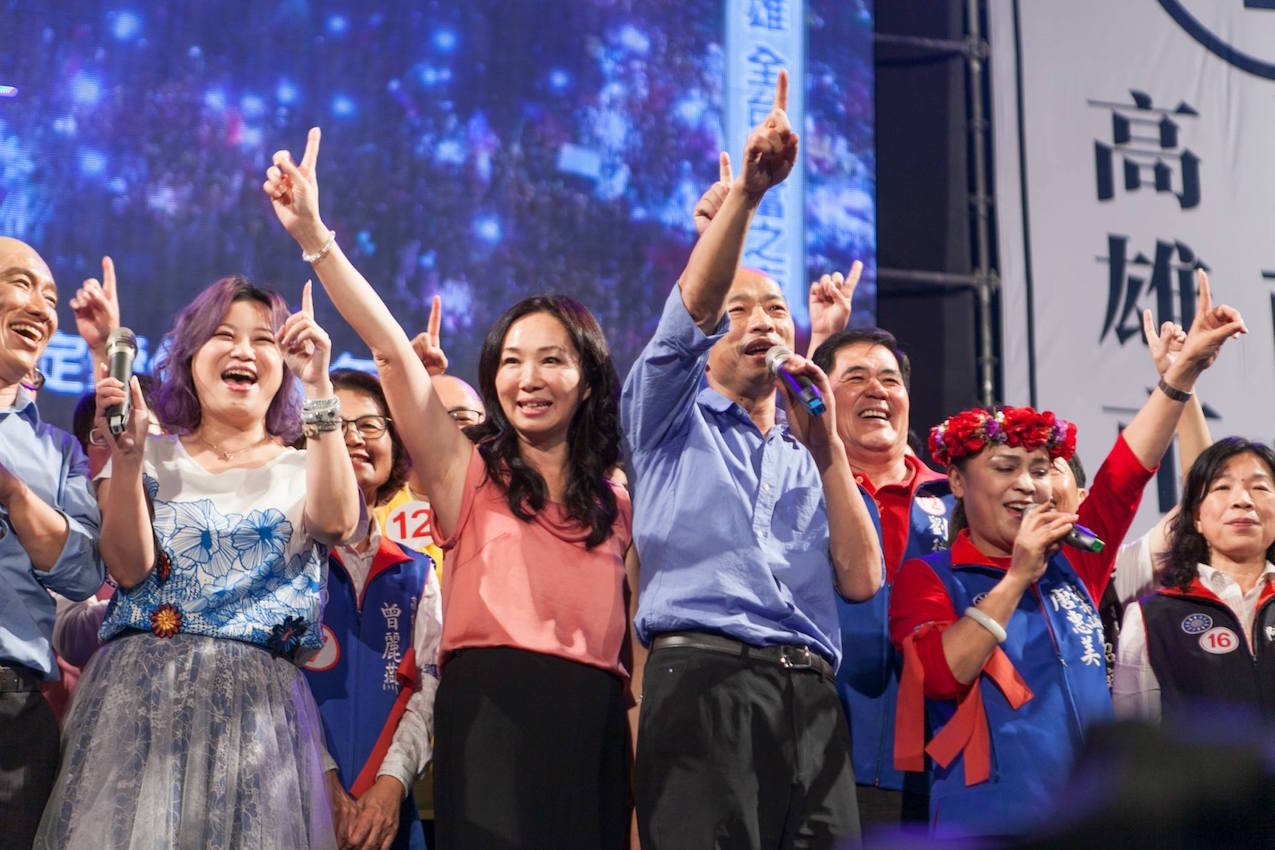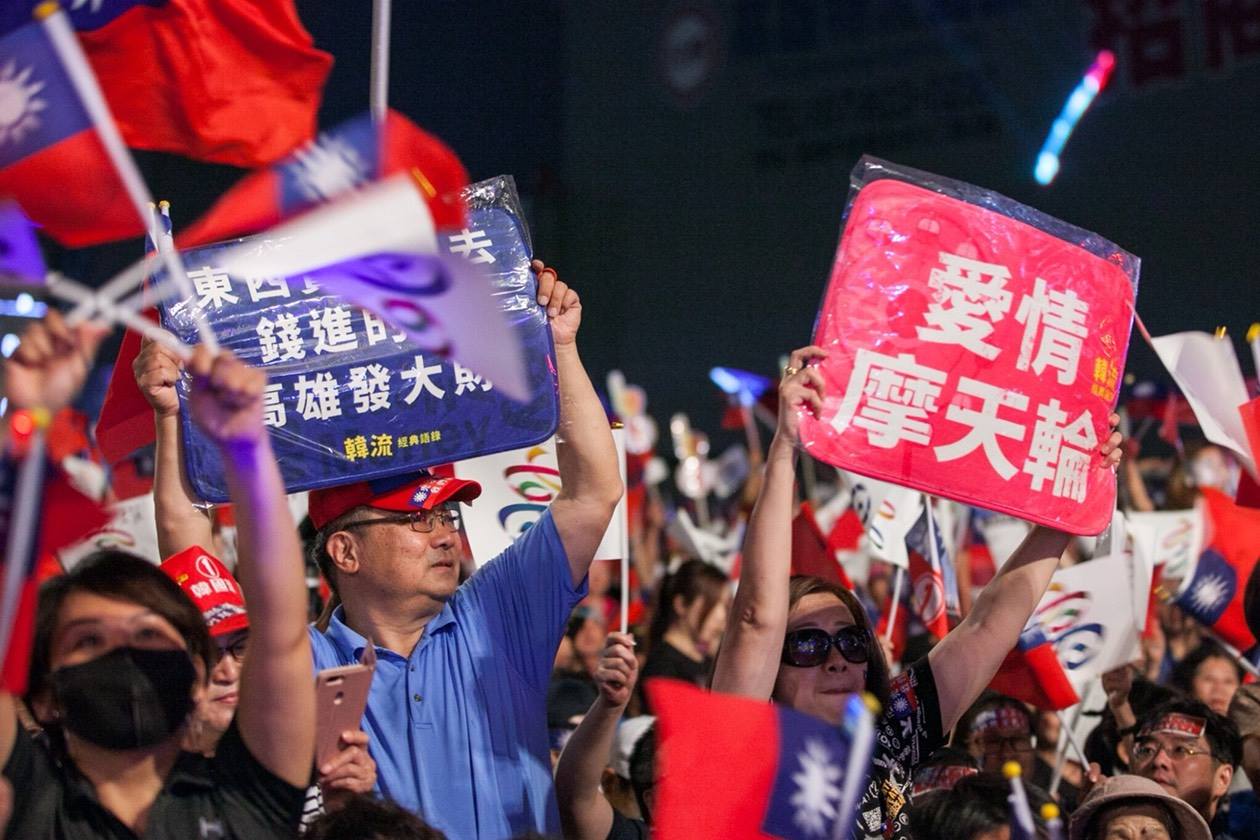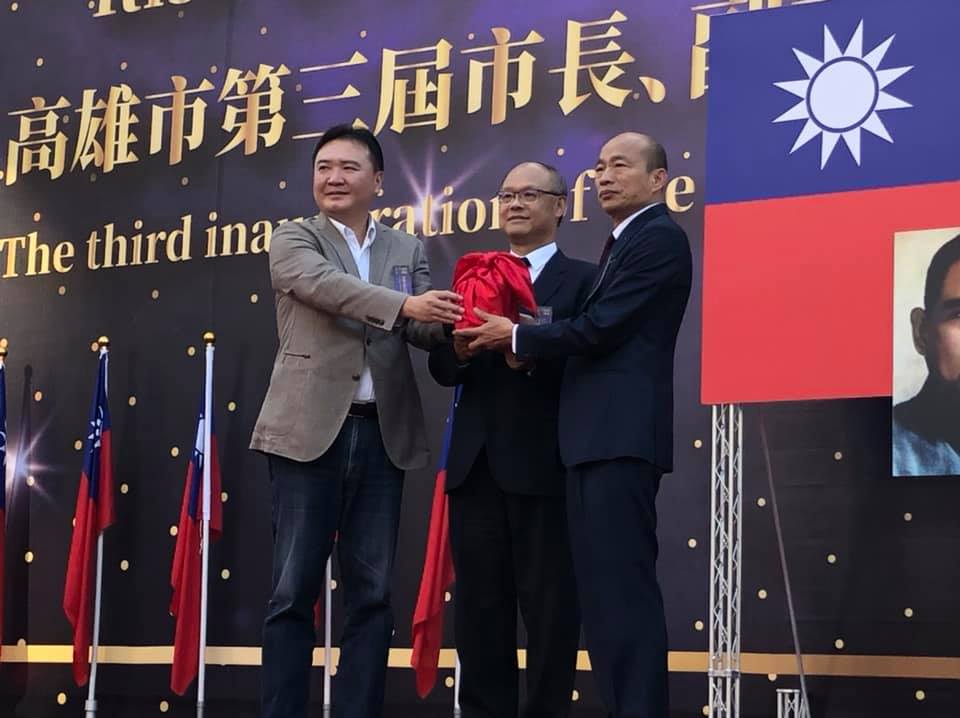by Brian Hioe
語言:
English
Photo Credit: Han Kuo-yu/Facebook
NEWS REPORTS earlier this month that Han Kuo-yu’s inauguration over the new year was attended by 800,000 people once again prove how easily Taiwanese news is duped by false reporting. Namely, despite how unlikely it would be for the inauguration of Han Kuo-yu to be attended by 800,000 individuals, this is what was claimed by a number of Taiwanese media outlets including UDN, SET, China Times, and TTV.
It was only afterward that statistics were released by the Kaohsiung MRT indicating that only 50,000 individuals were recorded as leaving the MRT station exit closest to where Han’s inauguration was due to take place, meshing with earlier estimates that Han’s inauguration would be attended by 20,000 to 30,000—by no means an insignificant number of individuals and still a high crowd count for a mayoral inauguration, but significantly less than 800,000 attendees.
 Han Kuo-yu (center) on the night of his election victory. Photo credit: Han Kuo-yu/Facebook
Han Kuo-yu (center) on the night of his election victory. Photo credit: Han Kuo-yu/Facebook
Indeed, counting crowds is a notoriously difficult exercise for news organizations. Reporters themselves are rarely if ever, professionals at crowd counting. And most demonstrations or rallies simply will not have the aerial photography present that allows for accurate crowd-counting. This oftentimes leaves reporters simply guesstimating numbers—or reliant on statistics provided by the organizers of a demonstration or rally, or crowd counts provided by the police.
In general, statistics provided by organizers tend to be over-inflated, seeing as organizers have an incentive in inflating the attendance numbers of events they organize so as to make it seem as though their cause has more support than it actually does. On the other hand, police estimates tend to grossly underestimate how large protest demonstrations are, probably because police have an incentive in making them look small.
Media outlets in Taiwan, however, generally tend to uncritically rely on organizers’ counts. As such, it is possible that the claim that 800,000 participated in Han’s inauguration came directly from the Han camp. Indeed, Han Kuo-yu has demonstrated a strong tendency to make exaggerated policy promises he is unlikely to follow through on, such as promising to build a Disneyland, an airport, a Ferris wheel, casinos, and a horseracing track in Kaohsiung, or to have Arnold Schwarzenegger visit Kaohsiung.
Exaggerating the numbers in attendance at his inauguration would be no surprise, then. As Han’s political style has sometimes compared to American president Donald Trump in Taiwanese political discourse, it actually not impossible that Han took a cue from Trump’s similar exaggeration of the number of people in attendance at his presidential inauguration. It is also to be noted that the claim that 800,000 attended the inauguration is significant because not even president Tsai Ing-wen’s inauguration was attended by that many people and the peak of the Sunflower Movement in 2014, Taiwan’s largest social movement in decades, was a demonstration by 500,000 people on March 30th, 2014.
 Han supporters during a rally. Photo credit: Han Kuo-yu/Facebook
Han supporters during a rally. Photo credit: Han Kuo-yu/Facebook
Likewise, it is important to note that media outlets in Taiwan tend to inflate crowd counts on the basis of their own partisan biases. It is not surprising that pan-Blue media outlets such as UDN or China Times would have the incentive to make it appear as though Han’s inauguration was much larger than it actually was. In this vein, it is also not surprising that pan-Green media outlets such as the Liberty Times were among the first to report that the numbers for Han’s inauguration were likely exaggerated.
China is accused of meddling in Taiwan’s elections using social media and the Internet, as observed in “fake news” stories of suspicious origin that broke out against Han’s opponent, Chen Chi-mai of the DPP, and suspicious upticks in how often Han was mentioned on the Internet in the months before the election. As a result, Han rose out of obscurity to superstardom, seemingly overnight.
Though it is probable that Han’s meteoric rise was not solely the result of Chinese election interference, one can see how misinformation efforts by China find fertile ground as a result of the poor fact-checking practices of Taiwanese media, which scarcely interrogates suspicious statistics provided by groups with highly evident biases. To this extent, Taiwanese news has become overreliant on the Internet and social media for reporting, with many reporters not venturing out into the field to confirm online reports. Furthermore, news outlets have increasingly few staff posted outside of central metropolises in order to verify reports from outside of high-density urban areas—although, seeing as Kaohsiung is Taiwan’s third-largest city, sometimes a failure to fact-check and lazy reporting prevails even within central metropolises.
Indeed, the media environment in Taiwan tends to be highly politicized in a manner which is detrimental to objective reporting. Apart from issues stemming from inflated crowd counts, this is also readily visible in how political polling in Taiwan tends to be highly inaccurate outside of academic institutions, with both political camps producing polls favorable to their political views, and a number of thinktanks seemingly to exist solely for the purpose of producing slanted polls.
 Han (right) during his inauguration. Photo credit: Han Kuo-yu/Facebook
Han (right) during his inauguration. Photo credit: Han Kuo-yu/Facebook
Media outlets tend also to be highly commercialized, relying on clickbait and sensationalistic reporting in order to drive up sales or hits. This has only become worse in an era in which the profit margins for media are lower and lower. As a result, this contributes to the unwillingness of media to truly question politicians and hold their feet to the fire on debatable policy claims for fear of alienating sources, or to pursue in-depth reporting about issues because of their lack of commercial appeal.
Though no media outlet ever is truly objective, but is always guided to some extent by biases and underlying ideology, the failure of Taiwanese news outlets to commit to any form of journalistic ethics or commitment to the truth contributes to Taiwan’s vulnerability to political manipulation, whether from China, the KMT, or even the pan-Green camp. Han Kuo-yu’s inauguration proves this in microcosm, as was already true about the failure of media to interrogate Han on many of his questionable claims during election campaigning.

